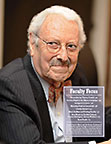Making a Law Class of a Fine-Feathered Story
Printer Friendly VersionProfessor of Law Katrina Wyman picked up the New York Times Sunday Book Review in February of last year without any particular academic intentions. The cover story that week was a review of Bruce Barcott’s The Last Flight of the Scarlet Macaw, the nonfiction account of an American expatriate’s unsuccessful attempt to prevent construction of a dam in Belize that would wipe out the habitat of the endangered scarlet macaw. “After I read the book,” Wyman recalled, “I realized that it raises a lot of interesting legal questions.” Enough legal questions, it proved, to become the focus of her semester-long Practice of Public Interest Environmental Law course.
This class—designed for a group of student fellows who had spent the previous summer doing environmental law work for NGOs or government agencies—had been taught at the Law School for several years, but Wyman decided to give it a complete structural overhaul for Fall 2008. She contacted experts, most of them directly involved in the story documented in Scarlet Macaw, to see if they’d be willing to lecture to the class. “They were quite interested in coming to talk about their involvement,” Wyman said. She even managed to secure the participation of the author. Barcott talked with Wyman and her students via a conference call from Seattle. Nearly every class meeting was augmented with a guest lecturer, including representatives from the Inter-American Development Bank, the Natural Resources Defense Council, and the Conservation Strategy Fund, all of whom had a direct role in aiding or ending the dam construction at the heart of the book. Dr. Joel Cohen—a Rockefeller University professor who was not directly involved in the case but offered his expertise in population biology to the class—lauded his experience with the class, referring to the students as “wonderful.” “They were very engaged,” he said, “and asked smart, informed questions.”
Students, too, appreciated the experience. “I thought it actually worked very well,” said Maron Greenleaf ’10. Rather than focus on one theoretical topic, students were instead invited to see this one particular case from many different angles and to place their legal knowledge in a real-world context. “Using the one book provided a lot of coherence,” said Greenleaf. Wyman plans to repeat the class in the future—but with different books. She is, after all, inclined to innovation.
–
All of 2009 Faculty Focus

 Multimedia
Multimedia